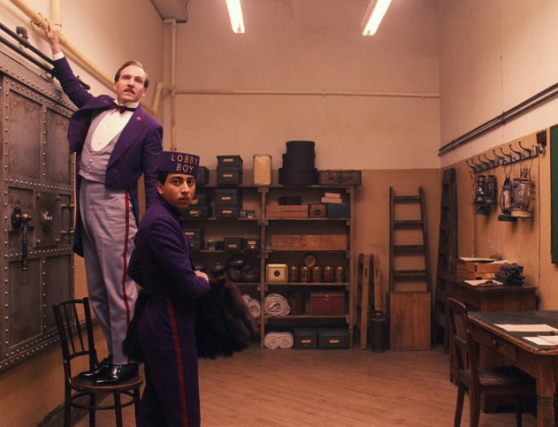27/31: The Grand Budapest Hotel

Photo: Fox Searchlight Pictures
When a Wes Anderson movie is good, I don’t tend to have a whole lot to say about it.
Certainly I don’t have a lot to say that would convince anyone who finds Anderson’s work and world-building cutesy and alienating that this one is for them — but I do think The Grand Budapest Hotel is a step forward for Anderson. It still has that (precociously) childlike attitude toward adult concerns, like M. Gustave’s (Ralph Fiennes, containing multitudes) stint in jail; it really only focuses on his escape and the lead-up to that, and doesn’t consider how a man like Gustave H. would fare in a real prison. It has the same attitude towards the war: sometimes it’s hell, mostly it’s an inconvenience. Fine; Anderson’s not interested in making Hamburger Hill and isn’t suited to it in the second place. He’s interested in tiny models of sleds flying off alpine jumps in chase sequences, and in the rolling-dice sound cue that accompanies a set of fingers, um, departing their host.
But TGBH feels more confident about that than other recent Anderson films. Gustave’s story ends rather abruptly, but that felt right to me, and it’s good that Anderson doesn’t feel obligated to linger over it. (F. Murray Abraham’s trembling chin in that scene more than covers the subject.) The long, Police Squad-esque freezes in place followed by the camera whipping around; the deep shots through darkness that look almost animated; Fiennes’s frequent, impatient “darling”s; the “get me Monsieur [x] at the [hotel name] … take over” bit, each thing and all taken together, seem more assured to me. I wouldn’t characterize his previous projects as diffident, mind you. I think he’s always known he’s not everyone’s cup of Sanka, and not cared much. TGBH feels freer somehow.
But while it’s enjoyable, and beautiful, it’s also on the disposable side, partly because it’s trying to do a lot (it’s a love story! and a murder mystery! and a heist pic!) and doesn’t stay on any one area of the story for long, partly because Tony Revoloni’s performance as Zero doesn’t rise to the level of Fiennes and Abraham’s. You could argue that his halting delivery is a character beat, a lost boy finding his resourcefulness, but it still doesn’t work, and it’s hard to get invested in the kid when he spends most of the film scuttling after Gustave and gives the impression of reading cue cards much of the rest of the time. Again, somber realism isn’t required, and it’s not that I don’t think Anderson can or wants to engage with darker emotions, because he can, and has. The Grand Budapest Hotel keeps its inherent sadness at a distance, though, and while you can argue — and I would — that Anderson’s careful style, and the fact that many of his characters have that same exacting approach to ordering their worlds, is itself a way of engaging with it by keeping it at arm’s length, sometimes arm’s length is a little too far away. In this case it’s the difference between good and great.
Tags: 31 Days 31 Films F. Murray Abraham movies Ralph Fiennes The Grand Budapest Hotel Tony Revoloni Wes Anderson





As a Wes Anderson fan, I do agree; this was a lot of fun (and I’m disappointed Ralph Fiennes wasn’t recognized by the Academy, as I never knew he’d be this good at this type of comedy), but it was a little too slight, not just in comparison to Anderson’s other work (and coming after MOONRISE KINGDOM, one of my favorites of his), but also compared to the writer he was trying to emulate, Stefan Zweig (who wrote the novella LETTER FROM AN UNKNOWN WOMAN – one of the great tragic romantic movies ever made – was based on). Part of it is because I don’t think that young romance here is well-defined, nor is Saoirse Ronan’s character well-defined, even though she’s important to the plot.
Agreed. Now that you mention it, that relationship felt like it got left on the editing-room floor, a bit.
I am a Wes Anderson lover, but I do think he just keeps trying to invent another Max Fisher, and Moonrise Kingdom and Grand Budapest Hotel had me yelling at the screen, “You, sir, are no Max Fisher!”
I enjoyed this one (and like all of his movies) but I do wish he would stop killing small animals as comedy.
@Jane, good note. It doesn’t really bother me, the same way Woody Allen’s various avatars don’t really bother me in his films per se (though not everyone is meant to play one…Branagh, lookin’ at you), and I don’t know what he might do instead, but you’re right.
@Shanchan, seriously. It would have cost him nothing to write a line where the cat bounced off an awning and landed safely elsewhere.
I don’t know. I used to count myself as a big Wes Anderson fan, but I think I’m going to have to redefine myself. I had a really hard time getting into this movie (three aborted starts before I finally saw the whole thing) and I think I’m just exhausted by how divorced from humanity his whole enterprise has become. I actually really enjoy his aesthetic and god knows I don’t have any inherent problem with twee-ness, but when I compare a movie like this one to his early work (Rushmore, Bottle Rocket, The Royal Tenenbaums), I think his conscious move away from a world grounded in reality has also left any recognizable human emotion on the cutting room floor. I can enjoy his movies as an aesthetic exercise, but I don’t connect emotionally with them anymore.
That said, I did totally love the Fantastic Mr. Fox.